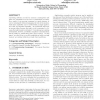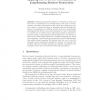37 search results - page 5 / 8 » Termination in Impure Concurrent Languages |
CONCUR
2004
Springer
14 years 1 months ago
2004
Springer
We develop new methods to statically bound the resources needed for the execution of systems of concurrent, interactive threads. Our study is concerned with a synchronous model of ...
IWMM
2004
Springer
14 years 1 months ago
2004
Springer
Operating systems account for memory consumption and allow for termination at the level of individual processes. As a result, if one process consumes too much memory, it can be te...
POPL
2009
ACM
14 years 8 months ago
2009
ACM
A concurrent data-structure implementation is considered nonblocking if it meets one of three following liveness criteria: waitfreedom, lock-freedom, or obstruction-freedom. Devel...
EUROPAR
2006
Springer
13 years 11 months ago
2006
Springer
Abstract. The global quiescence of a distributed computation (or distributed termination detection) is an important problem. Some concurrent programming languages and systems provi...
SAC
2009
ACM
14 years 2 months ago
2009
ACM
Ensuring transactional behavior of business processes and web service compositions is an essential issue in the area of serviceoriented computing. Transactions in this context may ...




